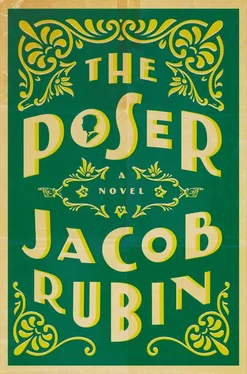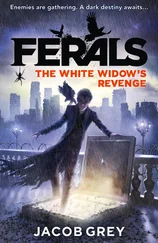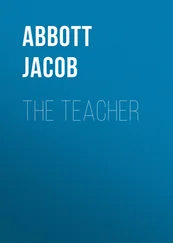By the glow of the vanity mirror Bernard Apache sat, smoking a cigarette, his brown trousers around his ankles, his moon-white legs spread. A head of long black hair bobbed furiously between his thighs. “Oh,” he said, seeing me.
Lucy did not try to right her appearance or dissemble — a futile task anyway, but a kind of expected courtesy — beyond shooting up and rubbing her mouth with the back of her hand, straightening her tousled dress and saying, “Giovanni, oh my G- ah -d, Giovanni!” She squeezed and unsqueezed her fists, nervously.
I squeezed mine, too.
“Giovaaanni!” She hopped up and down. “What are you doooing here?”
“Meeee?! What am I doing heeeere?” Like that, I had it! Yes! Her thread. The eyes had been right all along (hurt, wronged, accused, accusing), but I was missing the hands and tantrum feet. This was Lucy. When I would thrust her from behind and she would look back with those horrified, happy eyes, it was to reward me, to announce that she had, for a moment, been caught. Caught is what she wanted to be.
“Stooop it,” I said to her. “Just — just leave me alooone.”
Now that I had it, I could pull away, each strand joining the whole — the tilt of her head, the wild vowels. “Giovaaanni, please, ” I said, squeezing and unsqueezing my fists. The plastic-covered clothes on the rack, the rusty pipes, Apache, who had pulled up his pants but did not move from the chair, lighting a cigarette; Lucy who headed for the door — all of it seemed to be shaking.
“Giovaaaaanni! Nooo!”
• • •
A wailing infant on the crosstown bus, a homeless man saying, “Howdy do,” an irate black preacher surrounded by bruisers in fezzes notifying Second Avenue that God would be returning in a few days and wouldn’t be pleased. “You will be saved or you will be damned!” I yelled back at him. “A decision is required, it is required !” until one of those fezzed meatheads shoved me to the curb. “You the lieutenant of the devil,” he said. “Be gone, white man.”
My ending up at the Ambassador Hotel must have required various darting actions — packing a bag, hailing a cab, surviving the rich, handsome life of the lobby (the perfume shop manned by women who seemed always to pull down the ends of their blouses in a state of vigilant self-maintenance; the ring of armchairs by the window where men with pinky rings and silk cravats spoke in hushed voices) — though I remember only shutting the heavy door to room 3015, entering that sealed chamber ensconced in crimson drapes. It was what I’d come for, that hotel-room silence, thick and expensive (yes, in this fevered state I began to celebrate money and its uses for the first time; it was a means of separating yourself from the noises of the street by thirty stories, to hide away in some tower by the park; I thought of it, physically, as padding that you could stick between yourself and the world).
And yet, after only an hour or so, the silence proved far worse than any street noise. Like outer space, it coaxed a body to explode. I coughed up what voices I knew, but each stung my throat. Pacing, squeezing my neck, I noticed a radio on the nightstand. I flipped it on, undamming the voices. A newscast. A radio play about pilgrims. I mumbled along, like a parishioner. With some relief, I let it play through the night. That way, if I woke up at three a.m., there would be something in the air.
After three days, I tried parting the curtains and stepping out onto the balcony, but that general waft of noise, the honks of trucks and taxis, even at this distance, attached itself to me, and I shut both the curtains and balcony door.
Still, I believed I could conduct my life from that room — or would have believed it, if not for bad dreams, so solid they seemed to inhabit the room. In one, the hotel room was transported to the stage at the Communiqué, where an infinity of faces peered down at me, holding clipboards or winding large watches. Among the faces were all my old classmates in Sea View, Mr. Heedling, Bernard, Marguerite Harris, Mama, and Lucy. There was that man in the wedding dress from Marguerite’s party repeating, “Quite good, bravo, really.” Later I barged into the greenroom to find Lucy between the knees of a skeleton. Driven by this dream, I one night launched myself out of bed, dropped to my knees on the carpet, and worked my head up and down. “Giovaaanni! No!” I said again, whimpering, an ad for cigarettes playing in the background.
Soon I set up the hotel desk chair, so I could grip its arms as I bobbed my head. After a few beats, I would turn, as if sensing someone behind me. Then I would wipe my mouth with the back of my hand, shift my weight to my left leg, and come to a standing position. “Giovaaaaanni! No!” I would say, stomping my feet. I alternated stomping my right and left feet more quickly, balling and unballing my fists while bringing myself to tears — tears that ended abruptly the moment I started over, kneeling again, and placing my hands on the arms of the chair.
I repeated the act, turning off the radio in order to concentrate fully. With each iteration, I began to place more weight on the arms of the chair, a tweak that helped give more spring to the moment when I turned around, wiped my mouth with the back of my hand, and put the weight on my left knee. I had started around three a.m., working straight till eleven a.m., when the crashes and ascents of inspiration flatlined into a kind of airless certainty. My mouth felt wind-bitten from the all the rubs I’d given it with the back of my hand. Peering down at that chair, I understood, in a moment of hopelessness, that no matter how many inches I moved it, no matter how I threw my voice or accelerated my stomping, this chair would not be a person.
I turned on the radio again, my head splitting. And yet just as quickly shut it off. Before I knew it, I was hunting for socks.
I would find him in the office upstairs. “C’mooon, you, we’re going to the greeeeenroom!” I’d say, leading him by the hand. Like Lucy herself, I wouldn’t care who saw us. And I could picture him laughing as I led him backstage, being game . Perhaps he had already done such things before. Perhaps he was, in his inscrutable way, all but encouraging it.
As soon as I stepped into the hallway, though, I ducked back into the room. This time I sat on the chair, sliding my pants down my legs until they pooled about my ankles. I worked my way into that lightly perturbed expression. I sat there for some time, letting it “soak,” as Mama used to say. It needed something. I pulled my pants up, and with purposeful strides, entered the life in the elevator and lobby, passing the doormen in broad, brass-buttoned overcoats. With those same strides, all but holding my breath, I made my way to the corner store where I purchased a pack of Blue Arrow cigarettes.
Returning to the safety of my room, I lit a cigarette with matches the cashier had given me. This made it better, except Bernard never used matches, and the falsity of striking one opened a fissure in the act. So I pulled up my jeans and ventured outside again, purchasing a silver-plated lighter at a tobacconist on Amity Street, maintaining what calm I could as I waited, along with two chatty tourists, for the gold-trim elevator doors to part. Then I hustled back to my room where I sat back on the chair and slid my pants down, this time trying the lighter.
It was better, yes. But with this difficulty cleared up, my attention soon scurried to my ankles. Bernard, of course, had been wearing his customary suit, the fabric of which must have felt quite different from my bunched-up jeans. At first I tried to simulate the feeling of his suit by wrapping my legs in a bedsheet. Then I considered my shirt, which was, of course, all wrong. And my bare feet, which were not wearing his cowboy boots. It was like trying to plug holes in a sinking ship, only to have another appear.
Читать дальше












